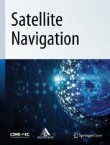18 members of the editorial board of Satellite Navigation were named in the World's Top 2% Scientists 2023 List released by Stanford University recently, among whom 10 were included in global Career-long Impact Ranking.
Academician Liu Jingnan, Editorial Advisor; Academician Yang Yuanxi, Editor in Chief; Professor Jin Shuanggen, Executive Editor in Chief/ Overseas Academician; Professor Naser El-Sheimy, Associate Editor/ Overseas Academician; Professor Chen Ruizhi, Associate Editor/ Overseas Academician; Professor Wu Yuanxin, Associate Editor; Professor Peter J. G. Teunissen, Editor/ Overseas Academician; Dr. Xu Peiliang, Editor; Professor Wang Jinling, Editor and Professor Zhang Xiaohong, Editor were included in the "Career-long Impact Ranking". The above editorial board members alongside Professor Yuan Yunbin, Associate Editor; Professor Lu Mingquan, Associate Editor; Professor Shi Chuang, Editor; Professor Li Xingxing, Editor; Professor Geng Jianghui, Editor; Professor Li Bofeng, Editor and Professor Zhuang Yuan, Youth Editor and Professor Li You, Youth Editor were included in the "Single Year Impact Ranking".
The sixth issue of the World's Top 2% Scientists 2023 List was published by the team of Professor John P. A. Ioannidis at Stanford University and Mendeley Data of Elsevier. Based on the Scopus database, the team selected the top 2% of scientists in the world by scoring them on six key factors. The ranking was divided into 22 disciplines and 174 sub-disciplines, and the database covered about 200,000 eminent scientists. The ranking was released in two categories: Career-long Impact Ranking and Single Year Impact Ranking, which corresponded to the comprehensive data from 1960 - 2022 and 2022 respectively.
The list is not intended to rank scholars, but rather to explore a multi-dimensional way to show the state of scientific research from the perspective of scientists and to provide a measure of scientists' long-term performance in scientific research, in the hope of reflecting their influence in a more objective and realistic way. Inclusion in the list means that the scholar has a high global influence in his or her research field.
